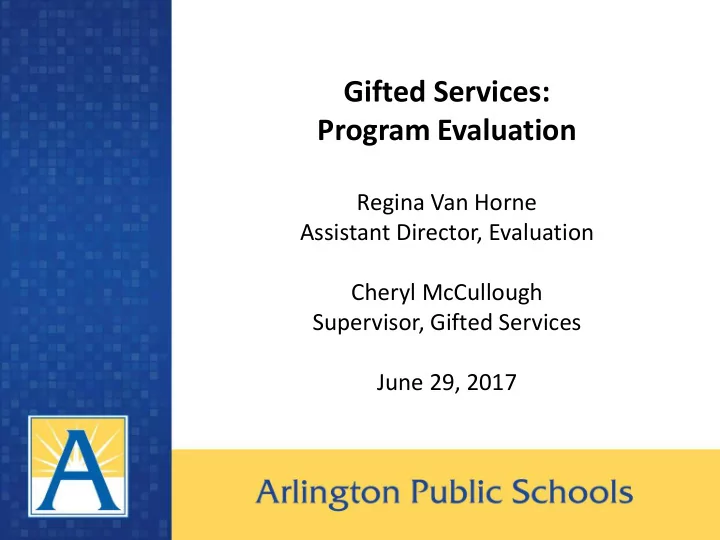

Gifted Services: Program Evaluation Regina Van Horne Assistant Director, Evaluation Cheryl McCullough Supervisor, Gifted Services June 29, 2017
Gifted Services: Goals and Services • Data-driven differentiation • Curricular resources written for gifted learners to add depth and complexity • Ongoing professional learning in a variety of settings for educators who work with gifted learners • Parent and community engagement • Consistent screening and identification process 2
Program Evaluation: Process Schedule 2016-17 2015-16 2014-15 Final Data Planning Year Report Collection 3
Program Evaluation: Key Findings 4
Access to Services Since implementation of universal screening: • Sharp increase in referrals • Increase in percentage of students with disabilities referred and identified • Continued need for emphasis on inclusiveness of all students 5
Delivery of Services • Policies and programming for gifted students offered as part of the regular school day 6
Quality of Instruction • Cluster teachers are committed to professional learning in the area of gifted education • Some differentiation strategies are used frequently • Teachers have access to curriculum materials designed for gifted learners • Elementary core content teachers are frequently using materials designed for the gifted 7
Student Outcomes • High level of student engagement in classroom observations • Parents report that their child is intellectually stimulated at school • Two-thirds of middle school students gifted in math complete Algebra I before 8 th grade • Most gifted students are enrolling in advanced coursework 8
Recommendations and Next Steps 9
Recommendation #1 - Differentiation Increase the use of differentiation strategies and personalized learning with gifted learners 10
Recommendation #1 – Next Steps • Increase personalized learning options • Use curricular resources that reinforce critical and creative thinking strategies • Increase understanding of differentiation and classroom management for cluster groups • Continue the expansion of Young Scholars across all Title I schools • Use measures of growth 11
Recommendation #2 - Roles and Responsibilities Clearly articulate expectations for gifted instruction and align these expectations with the roles and responsibilities of RTGs, classroom teachers, and principals, with a focus on the middle school level 12
Recommendation #2 - Next Steps Next steps: • Increase understanding and use of coaching, collaboration, and co-teaching skills • Evaluate existing RTG and cluster teacher roles and responsibilities • Develop performance evaluation criteria • Work with principals, school counselors, social workers and special educators to address the socio-emotional needs of gifted learners 13
Recommendation #3 - Data Take steps to improve the availability of data that will facilitate ready identification of trends and focus areas for gifted services and, subsequently, appropriate response 14
Recommendation #3 - Next Steps Next steps: • Direct Information Services to: – Provide Gifted Services access to specific data – Create reports on referrals and identification – Monitor clustering and credit roster • Address referral and identification gaps with schools • Provide plan for principals and RTGs to: – Increase understanding of universal screening – Identify and use measures of growth – Monitor referral process 15
Recommendation #4 - Communication Develop and implement a plan to clearly and regularly communicate gifted services information to students and families 16
Recommendation #4 – Next Steps • Communicate expectations with staff concerning frequency and nature of communication with families including revisions to current practice as needed. • Meet with stakeholders to determine strengths and areas of improvement • Develop communication plan for all schools • Develop and implement a common vocabulary for messaging • Ensure that messaging is consistent across all APS media 17
Gifted Services: Program Evaluation Regina Van Horne Assistant Director, Evaluation Cheryl McCullough Supervisor, Gifted Services June 29, 2017
Recommend
More recommend